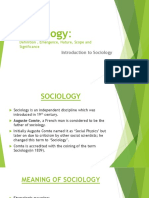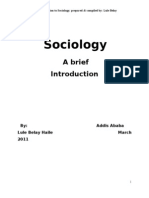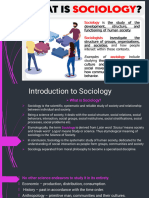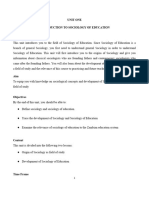0 ratings0% found this document useful (0 votes)
39 viewsSociology
Sociology
Uploaded by
Ayush Satish Upadhyaysociology
Copyright:
© All Rights Reserved
Available Formats
Download as RTF, PDF, TXT or read online from Scribd
Sociology
Sociology
Uploaded by
Ayush Satish Upadhyay0 ratings0% found this document useful (0 votes)
39 views26 pagessociology
Copyright
© © All Rights Reserved
Available Formats
RTF, PDF, TXT or read online from Scribd
Share this document
Did you find this document useful?
Is this content inappropriate?
sociology
Copyright:
© All Rights Reserved
Available Formats
Download as RTF, PDF, TXT or read online from Scribd
Download as rtf, pdf, or txt
0 ratings0% found this document useful (0 votes)
39 views26 pagesSociology
Sociology
Uploaded by
Ayush Satish Upadhyaysociology
Copyright:
© All Rights Reserved
Available Formats
Download as RTF, PDF, TXT or read online from Scribd
Download as rtf, pdf, or txt
You are on page 1of 26
What is Sociology?
[edit]
Emile Durkheim, one of the founders of Sociology.
Sociology is a branch of the social sciences that uses t
systematic methods of empirical investigation and critical
analysis to develop and refine a body of knowledge about
human social structure and activity, sometimes with the
goal of applying such knowledge to the pursuit of
government policies designed to benefit the general
social welfare. Its subject matter ranges from the micro
level to the macro level. Micro-sociology involves the
study of people in face-to-face interactions. Macro-
sociology involves the study of widespread social
processes.
Sociology is a broad discipline in terms of both
methodology and subject matter. Its traditional focuses
have included social relations, social stratification, social
interaction, culture and deviance, and its approaches
have included both qualitative and quantitative research
techniques. As much of what humans do fits under the
category of social structure or social activity, sociology
has gradually expanded its focus to such far-flung
subjects as the study of economic activity, health
disparities, and even the role of social activity in the
creation of scientific knowledge.[1] The range of social
scientific methods has also been broadly expanded. The
"cultural turn" of the 1970s and 1980s brought more
humanistic interpretive approaches to the study of
culture in sociology. Conversely, the same decades saw
the rise of new mathematically rigorous approaches, such
as social network analysis.
The social world is changing. Some argue it is growing;
others say it is shrinking.[2] The important point to grasp
is: society does not remain unchanged over time. As will
be discussed in more detail below, sociology has its roots
in significant societal changes (e.g., the industrial
revolution, the creation of empires, and the age of
enlightenment of scientific reasoning). Early practitioners
developed the discipline as an attempt to understand
societal changes.
Some early sociological theorists (e.g., Marx, Weber, and
Durkheim) were disturbed by the social processes they
believed to be driving the change, such as the quest for
solidarity, the attainment of social goals, and the rise and
fall of classes, to name a few examples. The founders of
sociology were some of the earliest individuals to employ
what C. Wright Mills (a prominent mid-20th century
American sociologist) labeled the sociological
imagination: the ability to situate personal troubles
within an informed framework of social issues.[3] Mills
proposed that:
"What people need... is a quality of mind that will help
them to use information and to develop reason in order
to achieve lucid summations of what is going on in the
world and of what may be happening within themselves.
The sociological imagination enables its possessor to
understand the larger historical scene in terms of its
meaning for the inner life and the external career of a
variety of individuals."[3]
As Mills saw it, the sociological imagination could help
individuals cope with the social world by helping them to
step outside of their personal, self-centric view of the
world. In employing the sociological imagination, people
are able to see the events and social structures that
influence behavior, attitudes, and culture.
The sociological imagination goes beyond armchair
sociology or common sense. Many people believe they
understand the world and the events taking place within
it, even though they have not actually engaged in a
systematic attempt to understanding the social world, as
sociologists do. Humans like to attribute causes to events
and attempt to understand what is taking place around
them.[4] This is why individuals have been using religious
ceremonies for centuries to invoke the will of the gods -
because they believed the gods controlled certain
elements of the natural world (e.g., the weather). Just as
sacrificing two goats to ensure the safe operation of a
Boeing 757 (and propitiate Akash Bhairab, the Hindu sky
god) is an attempt to influence the natural world without
first trying to understand how it works,[5] armchair
sociology is an attempt to understand how the social
world works without employing scientific methods.
It would be inaccurate to say sociologists never sit around
(even sometimes in comfy armchairs) trying to figure out
how the world works. But induction is just a first step in
understanding the social world. In order to test their
theories, sociologists get up from their armchairs and
enter the social world. They gather data and evaluate
their theories in light of the data they collect (a.k.a.
deduction). Sociologists do not just propose theories
about how the social world works. Sociologists test their
theories about how the world works using the scientific
method.
Sociologists, like all humans, have values, beliefs, and
even pre-conceived notions of what they might find in
doing their research. But, as Peter Berger, a well-known
sociologist, has argued, what distinguishes the sociologist
from non-scientific researchers is that "[the] sociologist
tries to see what is there. He may have hopes or fears
concerning what he may find. But he will try to see,
regardless of his hopes or fears. It is thus an act of pure
perception..."[6]
Sociology, then, is an attempt to understand the social
world by situating social events in their corresponding
environment (i.e., social structure, culture, history) and
trying to understand social phenomena by collecting and
analyzing empirical
data.https://en.wikibooks.org/wiki/Introduction_to_Soci
ology
............................................................................................
............................................................................................
.......................................................................................
Emergency of Sociology:
Sociology has a long past, but only a short history. The
study of human society in scientific way is said to have
begun with August Comte. The emergence of sociology
as a discipline of academic interest is of recent origin. Its
emergence as a discipline can be attributed to the vast
changes that took place in the nineteenth century.
Various strains and tendencies, some intellectual and
some social, combined to-form the science of sociology.
To quote Bottom ore, “The conditions which gave rise to
sociology were both intellectual and social”.
The chief intellectual antecedents of sociology are
summed up by Ginsberg in the following words: Broadly
it may be said that sociology has had a fourfold origin in
political philosophy, the philosophy of history, biological
theories of evolution and the movements for social and
political reform which found it necessary to undertake
survey of social conditions.
Over the time, there had grown the intellectual tradition
described as the historical tradition or the philosophy of
history, which believed the general idea of progress. To
combat the influence of theology on history, the thinkers
of the Enlightenments introduced the idea of causality
into history of philosophy, elaborated the theory of
progress. But philosophy of history as a distinct branch of
speculation is a creation eighteenth century.
The philosophical historians introduced the new
conception of society as something more than the
political society’ or the State. They were concerned with
the whole range of social institution and made a
distinction between the State and what they called ‘civil
society’.
They were concerned with discussions of the nature of
society, classification of societies into types, population,
family, Government, morality and law etc. In the early
part of the nineteenth century the philosophy of history
became an important intellectual influence through the
writings of Hegel and Saint-Simon. The features of
writings of philosophical historian reappeared in the
nineteenth century, in the works of Comte and Spencer.
“A second important element in modern sociology” to
quote Bottom ore is provided by social survey which itself
has two sources. The first was the growing conviction of
the applicability of the methods of natural sciences to the
study of human affairs.
The second was the movement for social and political
reforms which made it necessary to undertake surveys of
social problems like poverty which arose in the industrial
societies of Western Europe. The social survey came to
occupy an important place in the new science of society
and it was one of the principal methods of sociological
enquiry.
These intellectual movements, the philosophy of history,
and the social survey were themselves the product of
social settings of the eighteenth and nineteenth-century
Western Europe. The Philosophy of history was not
merely a child of thought. It was born of two revolutions,
the Industrial Revolution and the Political Revolutions in
France. Similarly, the social survey emerged from a new
conception of evils of industrial society.
All intellectual fields are profoundly shaped by their
social setting. This is particularly true of sociology, which
is not only derived from that setting but takes the social
setting as its basic subject matter. We will focus briefly on
few of the most important social conditions of
nineteenth and early twentieth century that were of type
utmost significant in the development of sociology.
The long series of revolutions ushered in by French
Revolution in 1789 and carrying over through the
nineteenth century, and the Industrial Revolution were
the important factors in the development of sociology.
The upheaval of French revolution was a turning point in
the history of thinking about society. It was also largely
responsible for the development of Sociology.
According to Berger and Berger, So is one of the
intellectual products of the French Revolution. The
impact of these revolutions on many societies was
enormous and many changes were resulted which were
positive in nature. But these revolutions have also
brought about social changes which had negative effects.
The negative effects of social change brought by French
Revolution manifested in forms of chaos and disorder.
Similarly, Industrial Revolution brought many social
problems and evils such as labour-capital dispute, the
problem of housing, increasing concentrations of people
in urban areas etc.
The chaos and disorder resulted by political revolutions in
France and the problems unleashed by tremendous
changes brought by the industrialisation led to the study
of social problems and to find new bases of order in
societies. The interest in the issue of social order was one
of the major concern of August Comte who created
sociology as a separate science.
He felt a need for a social science which is concerned
with society as a whole or with total social structure
because all other social sciences deal with particular
aspect of the society. He was the first man to create a
new science of society and to distinguish the subject-
matter of sociology from all other social sciences. Comte
developed -the first complete approach to the scientific
study of society.
Other social sciences may give a snapshot view of society
from various angles but never a view of society in its
comprehensive totality. Sociology appeared when it was
felt that the other fields of human knowledge do not fully
explain main’s social behaviour.
Comte decided to study the whole series of theoretical
sciences which he identified with positive philosophy.
From the result of such study Comte sought to formulate
a system of laws governing society so that he could
postulate a cure for society on the basis of these laws.
From 1817 to 1823 Comte and Saint-Simon collaborated
and this collaboration was specially marked in the work
‘plan of the scientific operations necessary for the
reorganisation of the Society’. In the latter years Comte
called this work “the great discovery of the year 1822”. In
1822 when he (with Saint -Simon) conceived the
necessity of the new science, he intended to name the
new science social physics.
He wrote, “I understand by social physics the science
which has for its subject the study of social phenomena
considered in the same spirit as astronomical, physical,
chemical or physiological phenomena that is subject to
natural invariable laws the discovery of which is the
special object of investigation”. Thus, the programme of a
new science (latter to be renamed sociology) was clearly
stated.
Soon after the publication of their work, Comte and Saint
– Simon dissolved their partnership and began bitterly to
attack each other. Comte’s lecture notes were gradually
published between 1830 and 1842, forming his
voluminous master work, Course of Positive Philosophy in
six volumes. Very reluctantly Comte changed the name of
the new science from social physics to sociology.
In the latter part of his Positive Philosophy he explained
that he had invented a new name because the old one
had been usurped by Belgian scientist who chose it as the
title for a work. The work has referred to was Quetelet’s
An Essay on Social Physics.
In Positive Politics, Comte attempted to give more flesh
and blood to rather formal definition of sociology implied
in Positive Philosophy. Between the years 1851 and 1854,
he wrote a treaties entitled System of Positive Politics in
which he applied the findings of theoretical sociology to
the solution of social problems of his time. Thus,
accomplished his initial goal, the improvement of society.
www.yourarticlelibrary.com/sociology/...emergence...dev
elopment-of-sociology.../8484/
.................................................................................. .........
...................------------------------------------------------------------
----------------------------------------------------------------------------
www.yourarticlelibrary.com/sociology/...emergence...dev
elopment-of-sociology.../8484/
The Industrial Revolution was the transition to new
manufacturing processes in the period from about 1760
to sometime between 1820 and 1840. This transition
included going from hand production methods to
machines, new chemical manufacturing and iron
production processes, improved efficiency of water
power, the increasing use of steam power, the
development of machine tools and the rise of the factory
system. It also included the change from wood and other
bio-fuels to coal. Textiles were the dominant industry of
the Industrial Revolution in terms of employment, value
of output and capital invested; the textile industry was
also the first to use modern production methods.[1]:40
The Industrial Revolution marks a major turning point in
history; almost every aspect of daily life was influenced in
some way. In particular, average income and population
began to exhibit unprecedented sustained growth. Some
economists say that the major impact of the Industrial
Revolution was that the standard of living for the general
population began to increase consistently for the first
time in history, although others have said that it did not
begin to meaningfully improve until the late 19th and
20th centuries.[2][3][4]
The Industrial Revolution began in Great Britain, and
industrialisation spread to Western Europe and North
America within a few decades. Since then
industrialisation has spread throughout the world.[1] The
precise start and end of the Industrial Revolution is still
debated among historians, as is the pace of economic
and social changes.[5][6][7][8] GDP per capita was
broadly stable before the Industrial Revolution and the
emergence of the modern capitalist economy,[9] while
the Industrial Revolution began an era of per-capita
economic
Causes and Effects of the French Revolution Revolution?
The major cause of the French Revolution was the
disputes between the different types of social classes in
French society. The French Revolution of 1789-1799 was
one of the most important events in the history of the
world. The Revolution led to many changes in France,
which at the time of the Revolution, was the most
powerful state in Europe. The Revolution led to the
development of new political forces such as democracy
and nationalism. It questioned the authority of kings,
priests, and nobles. The Revolution also gave new
meanings and new ideas to the political ideas of the
people.
The French revolution of 1789 in many respects
overshadowed the 19th century as a revolution that
challenged and successfully overthrew the old order of
society. It was a revolution that strengthened the state
which aimed to represent the will of the people. It is
important first therefore to recognise that the political
and cultural climate that existed before the revolution
was dominated by the church and the monarchy.
The abolishment of all religious order falls into Comte’s
theory that throughout history, society has been guided
by three distinct stages, theological, metaphysical and
scientific[1]. A country with religious order, Comte
believed, was a theological approach which deemed the
condition of society to be Gods will. The monarchy had
always upheld their position of power by insisting that
the right to rule derives from God and that kings are
answerable for their actions to God alone. By abolishing
both the monarchy and religious order, the revolution
marks the move away from Comte’s ‘theological’ stage.
The citizens of France were granted new legal rights, a
broad centralised education system and a new system of
inheritance. These changes all challenged a previous
traditional model, and hence gave individual citizens a
different perspective of society.
The study of this new perspective and the introduction of
individual rights marked the beginning of sociology as a
discipline, and confirm the French revolution’s vast
influence over the field. Karl Marx, one of the key
philosophical, economic and sociological figures of
modern times was strongly influenced by the revolution
of 1789, and hoped other similar revolutions elsewhere
against feudal or oppressive societies would follow. When
Marx’s ideas finally got put into practice after the Russian
revolution in October 1917, analysis of this event by Leon
Trotsky was written and conducted in terms of the French
Revolution and therefore shows how this event still has
relevance when studying social uprisings today.
With a greater emphasis on the state as opposed to an
established monarchy and church system, a new social
movement known as nationalism came into existence, as
some replaced allegiance to God and the monarchy with
an allegiance to the state. Nationalism has sparked
various uprisings since the French revolution (most
notably National Socialism in Germany during the 1930’s)
and again gave people another perspective of the society
they live in. This is relevant as Nationalism is studied in
depth in social scientific fields such as anthropology and
sociology today.
It could be argued that the intellectual revolution known
as ‘the Enlightenment’ during the 18th century lay the
ground for the French revolution which saw through
significant social change. It brought about an ideology
which believed that scientific and historical study should
be looked at and incorporated into a philosophical
perspective. Enlightenment figures such as Charles
Montesquieu, one of the pioneers of social science, saw
humanity as something that develops from infancy to
maturity with conflict in between the different stages. He
also believed that the Enlightenment could be the
beginning of a great period of human development, as
science was being applied to humanity. This could be
described as the birth of sociology and of social scientific
thought.
Another important Enlightenment philosopher was Claud
Henry de Saint Simon, who fell in-between
enlightenment and counter enlightenment ideas.
Through the study of western history he believed in
rational progress through scientific thought, and a new
society based on industrial production and scientific
discovery. His ideas were highly influential during this
emergence of sociological thought.
The Enlightenment period coincided with the increase in
knowledge in other scientific fields such as life sciences.
Darwin’s studies into evolution were controversial as they
challenged old established ideas of the church. From a
sociological perspective, the basis of ‘survival of the
fittest’ brought about ‘social Darwinism’, a fiercely
conservative ideology that believed that society will
gradually improve on the basis that the ‘fittest’ (i.e. the
most intelligent and productive members of society) will
be the most successful and therefore ‘survive’. Since this
is one of the cornerstones of capitalist thought (the
dominant political and economic presence in the western
world today) it has contributed to the emergence of
sociology, with thinkers such as Herbert Spencer and Karl
Marx holding completely contrasting sociological ideas
regarding capitalism.
MORRISON, K (1995) Marx Durkheim Weber: Formations
of Modern Social Thought, SAGE Publications, LondonThe
major cause of the Revolution were the differences these
three groups had. However, there was another important
factor during these times. France suffered from harsh
economic problems. Poor farm harvests by farmers hurt
the economy, and trade rules from the Middle Ages still
survived, making trade difficult. However, the most
serious problem was the problem facing the government
during this time. The French government borrowed much
money to pay for the wars of Louis XIV. Louis still
borrowed money to fight wars and to keep French power
alive in Europe. These costs greatly increased the
national debt, which was, at t_____________he time,
already too high.
.......------------------------------------
______________________________________________
______________________________________________
______________________________________---------
The Age of Enlightenment or simply the Enlightenment or
Age of Reason is an era from the 1620s to the 1780s in
which cultural and intellectual forces in Western Europe
emphasized reason, analysis, and individualism rather
than traditional lines of authority. It was promoted by
philosophes and local thinkers in urban coffee houses,
salons, and Masonic lodges. It challenged the authority of
institutions that were deeply rooted in society, especially
the Roman Catholic Church; there was much talk of ways
to reform society with toleration, science and skepticism.
Philosophers including Francis Bacon (1562–1626), René
Descartes (1596–1650), John Locke (1632–1704), Baruch
Spinoza (1632–77), Pierre Bayle (1647–1706),
Giambattista Vico (1668–1744), Voltaire (1694–1778),
David Hume (1711–76), Immanuel Kant (1724–1804),
Cesare Beccaria (1738–94), Francesco Mario Pagano
(1748–99) and Sir Isaac Newton (1642–1727)[1]
influenced society by publishing widely read works. Upon
learning about enlightened views, some rulers met with
intellectuals and tried to apply their reforms, such as
allowing for toleration, or accepting multiple religions, in
what became known as enlightened absolutism.
Coinciding with the Age of Enlightenment was the
Scientific revolution, spearheaded by Newton.
New ideas and beliefs spread around the continent and
were fostered by an increase in literacy due to a
departure from solely religious texts. Publications include
Encyclopédie (1751–72) that was edited by Denis Diderot
and (until 1759) Jean le Rond d'Alembert. Some 25,000
copies of the 35 volume encyclopedia were sold, half of
them outside France. The Dictionnaire philosophique
(Philosophical Dictionary, 1764) and Letters on the
English (1733) written by Voltaire (1694–1778) were
revolutionary texts that spread the ideals of the
Enlightenment. Some of these ideals proved influential
and decisive in the course of the French Revolution,
which began in 1789. After the Revolution, the
Enlightenment was followed by an opposing intellectual
movement known as Romanticism.
Although Enlightenment thinkers generally shared a
similar set of values, their philosophical perspectives and
methodological approaches to accomplishing their goals
varied in significant and sometimes contradictory ways.
As Outram notes, the Enlightenment comprised "many
different paths, varying in time and geography, to the
common goals of progress, of tolerance, and the removal
of abuses in Church and state".[21]
In his essay What is Enlightenment? (1784), Immanuel
Kant described it simply as freedom to use one's own
intelligence.[22] More broadly, the Enlightenment period
is marked by increasing empiricism, scientific rigor, and
reductionism, along with increased questioning of
religious orthodoxy.
Historian Peter Gay asserts that the Enlightenment broke
through "the sacred circle,"[23] whose dogma had
circumscribed thinking. The Sacred Circle is a term he
uses to describe the interdependent relationship
between the hereditary aristocracy, the leaders of the
church, and the text of the Bible. This interrelationship
manifests itself as kings invoking the doctrine "Divine
Right of Kings" to rule. Thus, the church sanctioned the
rule of the king and in return the king defended the
church.
Zafirovski (2010) argues that the Enlightenment is the
source of critical ideas, such as the centrality of freedom,
democracy, and reason as primary values of society – as
opposed to the divine right of kings or traditions as the
ruling authority.[24] This view argues that the
establishment of a contractual basis of rights would lead
to the market mechanism and capitalism, the scientific
method, religious tolerance, and the organization of
states into self-governing republics through democratic
means. In this view, the tendency of the philosophes in
particular to apply rationality to every problem is
considered the essential change.[25] Later critics of the
Enlightenment, such as the Romantics of the 19th
century, contended that its goals for rationality in human
affairs were too ambitious ever to be achieved.[26]
A variety of 19th-century movements, including
liberalism and neo-classicism, traced their intellectual
heritage back to the Enlightenment.[27]
National variations[edit]
You might also like
- Anton Chekov - Religion and PoliticsDocument13 pagesAnton Chekov - Religion and PoliticsJP Rajendran100% (2)
- School As A Formal OrganizationDocument4 pagesSchool As A Formal OrganizationChiamaka Eziuku100% (4)
- Integralist Manifesto - October 1932Document5 pagesIntegralist Manifesto - October 1932bruhgNo ratings yet
- Module 2: The Philippines During The 19 Century:: Learning OutcomesDocument5 pagesModule 2: The Philippines During The 19 Century:: Learning OutcomesNicol Jay DuriguezNo ratings yet
- So CIA LogyDocument197 pagesSo CIA LogySanthosh RagavNo ratings yet
- Basic CONCEPTS of Sociology...Document18 pagesBasic CONCEPTS of Sociology...Shakti Swaroop Reddy Mylavaram80% (5)
- Introduction To Sociology 07011741304Document34 pagesIntroduction To Sociology 07011741304Ezeh Japhet echefunaNo ratings yet
- Chapter 1Document9 pagesChapter 1Naeem ShaikhNo ratings yet
- 1.the Sociological Perspective: Sociology Is The Scientific Study of Human Society & Social BehaviorDocument36 pages1.the Sociological Perspective: Sociology Is The Scientific Study of Human Society & Social BehaviorArsalan NadeemNo ratings yet
- An Introduction To Literature SociologyDocument36 pagesAn Introduction To Literature SociologySaad KaliaNo ratings yet
- Subject Matter of SociologyDocument7 pagesSubject Matter of Sociologyfaithalozie761No ratings yet
- 1 Sociology - Presentation TranscriptDocument6 pages1 Sociology - Presentation TranscriptMersabak Abby100% (1)
- Extent of SociologyDocument9 pagesExtent of SociologyWasifNo ratings yet
- Nature of SociologyDocument19 pagesNature of Sociologynooranimd466No ratings yet
- NOTESDocument10 pagesNOTESEmmanuel ImbwagaNo ratings yet
- Sociology Paper 1 PYQ Notes 2014-2022Document33 pagesSociology Paper 1 PYQ Notes 2014-2022Preet ChaudharyNo ratings yet
- Sociology CHAPTER 1 SEM FinalDocument26 pagesSociology CHAPTER 1 SEM FinalDevmani Devmani100% (1)
- Class One LectureDocument10 pagesClass One LectureNasiruddin Mahmud HimelNo ratings yet
- Occidental Mindoro State College: Republic of The PhilippineDocument3 pagesOccidental Mindoro State College: Republic of The Philippinerosana f.rodriguez100% (1)
- 2 book aishaDocument73 pages2 book aisharecruitmentworld1998No ratings yet
- Chapter 1: The Sociological PerspectiveDocument9 pagesChapter 1: The Sociological PerspectiveKainaat fatimaNo ratings yet
- unit-1 prin,soc 2023Document21 pagesunit-1 prin,soc 2023gurumoorthysaravanarajanNo ratings yet
- Lecture 1. Sociology IntroductionDocument3 pagesLecture 1. Sociology IntroductionMadvali QurbonovNo ratings yet
- Unit 1 SociologyDocument25 pagesUnit 1 SociologySurakshya PokhrelNo ratings yet
- Week 1 Sociology IntroDocument20 pagesWeek 1 Sociology Intronayf.albadanyNo ratings yet
- History of SociologyDocument48 pagesHistory of Sociologyrosana f.rodriguez100% (1)
- The Origins and Foundation of SociologyDocument12 pagesThe Origins and Foundation of Sociologyfardeenrezakhan1No ratings yet
- Sociology Lecture 1Document2 pagesSociology Lecture 1Agnieszka HuzarskaNo ratings yet
- Introduction To SociologyDocument45 pagesIntroduction To Sociologyaman rajputNo ratings yet
- Introduction To SociologyDocument67 pagesIntroduction To SociologyTsadenna G. Assefa83% (6)
- Introduction To SociologyDocument100 pagesIntroduction To Sociologyishakhossain5050No ratings yet
- Social Behavioural Sciences NoteDocument36 pagesSocial Behavioural Sciences Noteolyken2023No ratings yet
- 1438 The Development of Sociology As A DisciplineDocument3 pages1438 The Development of Sociology As A Disciplinejeneille belfonNo ratings yet
- Sociology Is The Study of Human Social Relationships and InstitutionsDocument8 pagesSociology Is The Study of Human Social Relationships and InstitutionsNapoleonPascualNo ratings yet
- SociologyDocument117 pagesSociologySatyam PathakNo ratings yet
- Assignment IN Teaching Social Studies in The Elementary GradesDocument6 pagesAssignment IN Teaching Social Studies in The Elementary GradesFiona MatiasNo ratings yet
- Soc 301 - History of Sociological ThoughtsDocument21 pagesSoc 301 - History of Sociological Thoughtssleekclinton17No ratings yet
- Q.1 What Is Sociology? Discuss Its Scope of Studies and Development Over Time. (25) Answer: What Is SociologyDocument4 pagesQ.1 What Is Sociology? Discuss Its Scope of Studies and Development Over Time. (25) Answer: What Is SociologyAli AslamNo ratings yet
- Unit - 1 (Introduction to Sociology)Document19 pagesUnit - 1 (Introduction to Sociology)YashitaNo ratings yet
- Introduction To Sociology HumanitiesDocument10 pagesIntroduction To Sociology HumanitiesChavdaNo ratings yet
- Meaning of SociologyDocument8 pagesMeaning of Sociologyprachi.mpatraNo ratings yet
- Sociology@KsluDocument40 pagesSociology@KsluShriram JoshiNo ratings yet
- Social Science NotesdocxDocument7 pagesSocial Science NotesdocxIoannes Rovēros Rhoa NovelNo ratings yet
- Chapter 1-Sociological PerspectiveDocument6 pagesChapter 1-Sociological Perspectivefaaiz makhaniNo ratings yet
- Module One SociologyDocument16 pagesModule One SociologyKit DigeneralNo ratings yet
- Sociology and SocietyDocument24 pagesSociology and SocietyThe PaletteNo ratings yet
- AttachmentDocument95 pagesAttachmentmudaserjemalNo ratings yet
- Sociology: DefinitionsDocument5 pagesSociology: DefinitionsKrish KalroNo ratings yet
- Soc 101 - Handout 1Document26 pagesSoc 101 - Handout 1praiseomgbrumaye17No ratings yet
- Origin, Nature OF SociologyDocument3 pagesOrigin, Nature OF Sociologysurenderkushwaha0001No ratings yet
- Law Urry 2004 Enacting The SocialDocument22 pagesLaw Urry 2004 Enacting The SocialEdison HurtadoNo ratings yet
- Ps1-Unit 1Document12 pagesPs1-Unit 1narayanisreesNo ratings yet
- Societies and Cultures IIIDocument20 pagesSocieties and Cultures IIICDT Kait Vencent Aballe LequinNo ratings yet
- Lecture # 1 Sociological PerspectiveDocument26 pagesLecture # 1 Sociological PerspectiveUsmanChaudhryNo ratings yet
- Sociology NotesDocument21 pagesSociology NotesAdvay Singh raizadaNo ratings yet
- USCP - 1st QTRDocument27 pagesUSCP - 1st QTRBye Not thisNo ratings yet
- EDU 1011 Module OneDocument122 pagesEDU 1011 Module Onepelembanancy24No ratings yet
- LET-Sociology CultureDocument20 pagesLET-Sociology CultureMay-Ann S. CahiligNo ratings yet
- LET-Sociology CultureDocument20 pagesLET-Sociology CultureMay-Ann S. CahiligNo ratings yet
- Theories about and Strategies against Hegemonic Social SciencesFrom EverandTheories about and Strategies against Hegemonic Social SciencesNo ratings yet
- Social Theory: Ideas in Profile: Ideas in ProfileFrom EverandSocial Theory: Ideas in Profile: Ideas in ProfileRating: 4.5 out of 5 stars4.5/5 (2)
- The Universal Meaning of Life: The Scientific Method Applied to the Human Condition, #1From EverandThe Universal Meaning of Life: The Scientific Method Applied to the Human Condition, #1No ratings yet
- The Social Mind: Exploring the Intersection of Psychology and Social SciencesFrom EverandThe Social Mind: Exploring the Intersection of Psychology and Social SciencesNo ratings yet
- ServisProgramları 2023 2024 GüzDocument1 pageServisProgramları 2023 2024 GüzgodwinbisraelNo ratings yet
- 1.intro European HistoryDocument44 pages1.intro European HistorymohammedNo ratings yet
- Entrepreneurship 2022Document1 pageEntrepreneurship 2022Ishan GuptaNo ratings yet
- Pad350 Sustainable Development Final Test - 9 January 2022 Answer Sheet For Essay Questions Name Matric Number Group AnswerDocument6 pagesPad350 Sustainable Development Final Test - 9 January 2022 Answer Sheet For Essay Questions Name Matric Number Group AnswerFikri Rahman100% (1)
- EXIN Agile Scrum Manual - FrenchDocument88 pagesEXIN Agile Scrum Manual - FrenchJoseph Hermann BilongNo ratings yet
- Foundation of Values Education: Lesson 3Document14 pagesFoundation of Values Education: Lesson 3TRISHA MAE TRINIDADNo ratings yet
- Fathers & SonsDocument14 pagesFathers & SonsTim CraneNo ratings yet
- MK Bhutta Notes Ma English PDFDocument9 pagesMK Bhutta Notes Ma English PDFNoor Ulain100% (1)
- Engaging Students in The Study of Institute Courses and The PSA Units in DagaDocument10 pagesEngaging Students in The Study of Institute Courses and The PSA Units in DagaRobert SempoNo ratings yet
- Bohman y Lutz-Bachmann, Perpetual Peace Essays On Kant's Cosmopolitan IdealDocument258 pagesBohman y Lutz-Bachmann, Perpetual Peace Essays On Kant's Cosmopolitan IdealBegoña PessisNo ratings yet
- The Development of Learning EnglishDocument3 pagesThe Development of Learning EnglishReihan RizkyNo ratings yet
- MG8091 Entrepreneurship Development CT 1 QPDocument1 pageMG8091 Entrepreneurship Development CT 1 QPparandaman.mechNo ratings yet
- Human Flourishing in Progress and De-Development FinalDocument4 pagesHuman Flourishing in Progress and De-Development FinalMary Quezia AlferezNo ratings yet
- Tsou (2006) Genetic Epistemology and Piaget's Philosophy of Science: Piaget Vs Kuhn On Scientific ProgressDocument22 pagesTsou (2006) Genetic Epistemology and Piaget's Philosophy of Science: Piaget Vs Kuhn On Scientific Progressjytsou1No ratings yet
- History For Utopia - Saint-Simon and The Idea of ProgressDocument22 pagesHistory For Utopia - Saint-Simon and The Idea of ProgressRPNo ratings yet
- Taqi Al-Din Al-Nabhani and The Islamic Liberation PartyDocument18 pagesTaqi Al-Din Al-Nabhani and The Islamic Liberation PartyLaw StudentNo ratings yet
- Chapter 2 - Historical Perspective of Economic DevelopmentDocument4 pagesChapter 2 - Historical Perspective of Economic DevelopmentAlzen Marie DelvoNo ratings yet
- GCSE Class Notes On The VictoriansDocument3 pagesGCSE Class Notes On The VictoriansCrystal DonfackNo ratings yet
- How Change Happens: Interdisciplinary Perspectives For Human DevelopmentDocument59 pagesHow Change Happens: Interdisciplinary Perspectives For Human DevelopmentOxfam100% (1)
- SNVM QBDocument1 pageSNVM QBRutujaNo ratings yet
- Webinar Invitation- Udyamotsav 2025 - Funding Opportunity for StudentFaculty StDocument3 pagesWebinar Invitation- Udyamotsav 2025 - Funding Opportunity for StudentFaculty Stchemistryjsr8No ratings yet
- Gardner 1988 - Who - Is - An - Entrepreneur - Is - The - Wrong - QuestionDocument22 pagesGardner 1988 - Who - Is - An - Entrepreneur - Is - The - Wrong - QuestionChristiane Drozdek100% (1)
- GlobalizationDocument60 pagesGlobalizationFrancesca Veronique TablonNo ratings yet
- EnlightenmentDocument12 pagesEnlightenmentemilylovesflowers100% (2)
- Iic Activity Calendar 2021-22Document1 pageIic Activity Calendar 2021-22Srushti JainNo ratings yet
- 03 Theories On EthnicityDocument35 pages03 Theories On EthnicityXOME FRANo ratings yet

























































































